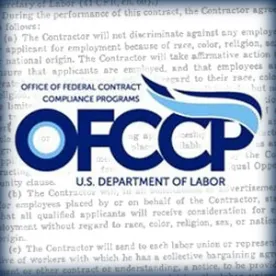As anticipated, on December 7, 2020, OFCCP published on its Website a lengthy final rule clarifying the religious exemption found at Section 204(3) of Executive Order (EO) 11246 and codified at 41 C.F.R. 60-1.5(a)(5) (the Exemption).
The purpose of this final rule is to clarify the contours of the E.O. 11246 religious exemption and the related obligations of federal contractors and subcontractors to ensure that OFCCP respects religious employers’ free exercise rights, protects workers from prohibited discrimination, and defends the values of a pluralistic society. This is the final version of OFCCP’s proposed rule published in August 2019.
Importantly, the rule specifically acknowledges that
[t]he rule does not affect the overwhelming majority of federal contractors and subcontractors, which are not religious, and OFCCP remains fully committed to enforcing all E.O. 11246 nondiscrimination requirements, including those protecting employees from discrimination on the bases of sexual orientation and gender identity. Even for religious organizations that serve as government contractors or subcontractors, they too must comply with all of E.O. 11246’s nondiscrimination requirements except in some narrow respects under some reasonable circumstances recognized by law.
The final rule is a culmination of a multi-year effort by OFCCP to reconcile the Exemption with Supreme Court cases, including those cited in the final rule:
- Masterpiece Cakeshop, Ltd. v. Colo. Civil Rights Comm’n, 138 S. Ct. 1719, 1731 (2018) (holding the government violates the Free Exercise Clause of the First Amendment when its decisions are based on hostility to religion or a religious viewpoint);
- Trinity Lutheran Church of Columbia, Inc. v. Comer, 137 S. Ct. 2012, 2022 (2017) (holding the government violates the Free Exercise Clause of the First Amendment when it decides to exclude an entity from a generally available public benefit because of its religious character, unless that decision withstands the strictest scrutiny);
- Burwell v. Hobby Lobby Stores, , 573 U.S. 682, 719 (2014) (holding the Religious Freedom Restoration Act applies to federal regulation of the activities of for-profit closely held corporations);
- Hosanna-Tabor Evangelical Lutheran Church & Sch. v. EEOC, 565 U.S. 171, 196 (2012) (holding the ministerial exception, grounded in the Establishment and Free Exercise clauses of the First Amendment, bars an employment-discrimination suit brought on behalf of a minister against the religious school for which she worked);
- Bostock v. Clayton Cnty., 140 S. Ct. 1731, 1754 (2020) (“[T]he promise of the free exercise of religion . . . lies at the heart of our pluralistic society.”);
- Little Sisters of the Poor Saints Peter & Paul Home v. Pennsylvania, 140 S. Ct. 2367, 2379–84 (2020) (holding the Departments of Labor, Health and Human Services, and the Treasury had authority to promulgate religious and conscience exemptions from the Affordable Care Act’s contraceptive mandate);
- Espinoza v. Mont. Dep’t of Revenue, 140 S. Ct. 2246 (2020) (a state “cannot disqualify some private schools [from a subsidy program] solely because they are religious” without violating the Free Exercise clause); and,
- Our Lady of Guadalupe Sch. v. Morrissey-Berru, 140 S. Ct. 2049, 2069 (2020) (holding the ministerial exception applies “[w]hen a school with a religious mission entrusts a teacher with the responsibility of educating and forming students in the faith”).
None of these cases specifically addressed the Exemption applicable to federal contractors, and some address the ministerial exception that is not part of the EO 11246 Exemption. Moreover, the 2020 cases were decided after OFCCP issued its initial proposed rule in August 2019. Nonetheless, OFCCP found a reconciliation of these cases and the Exemption to be necessary to protect religious organizations that may be reluctant to do business with the federal government. OFCCP specifically stated that the rule
is intended to correct any misperception that religious organizations are disfavored in government contracting by setting forth appropriate protections for their autonomy to hire employees who will further their religious missions, thereby providing clarity that may expand the eligible pool of federal contractors and subcontractors.
The primary clarifications of the Exemption are via new terminology definitions, including defining “particular religion” and “religious corporation, association, educational institution, or society,” “exercise of religion” and “sincere.” The final rule also provides a few examples of application of the exemption.
Finally, the Exemption is amended to dictate that it “be construed in favor of a broad protection of religious exercise, to the maximum extent permitted by the U.S. Constitution and law, including the Religious Freedom Restoration Act of 1993, as amended, 42 U.S.C. 2000bb et seq.”
The Exemption, albeit having a significant potential impact in individual instances, is theoretically narrow in application from OFCCP’s perspective. EEOC has weighed in on the topic separately and issued its own guidance. As noted in OFCCP’s discussion of the many comments it received in response to the proposed rule, many groups opposed the proposed rule arguing, for example, that an expansion of the Exemption is but “a pretext to permit discrimination against or harm others.” Given this, the publication of the final rule may prompt formal challenges.
It remains to be seen, of course, how OFCCP under a new presidential administration will interpret and enforce the final rule. We will keep you updated on any developments along this, or any other, front.





 />i
/>i

